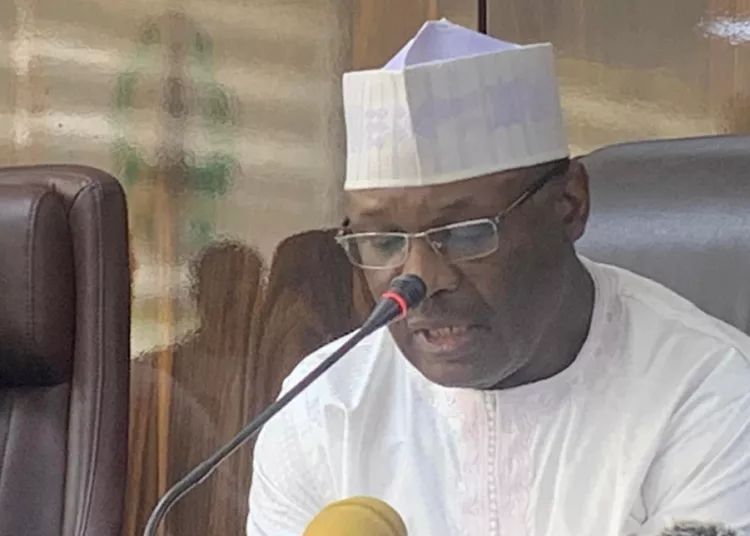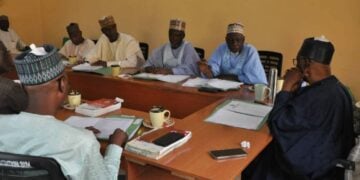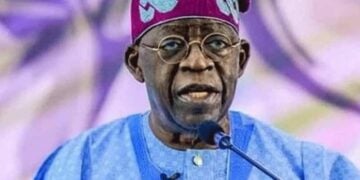At least 93.5 million Nigerians have been registered to vote in the 2023 general elections, according to the Independent National Electoral Commission (INEC).
Declaring the total number of eligible voters to participate in the exercise as preliminary registered eligible voters, INEC chairman, Prof. Mahmood Yakubu, noted that 12.29 million Nigerians successfully completed their registrations as new voters in the just-concluded Continuous Voter Registration (CVR) exercise.
Speaking Wednesday in Abuja during the third quarterly meeting with political parties, Yakubu said that after a rigorous cleanup of the data using the Automated Biometric Identification System (ABIS), over 2.78 million were identified and removed as ineligible registrants.
Consequently, he said the commission has identified 23 of its registration officers for severe sanctions having attempted to engage in multiple registrations of Nigerians.
The electoral body helmsman’s disclosures came as the Inter-Party Advisory Council (IPAC) passed a vote of confidence on him for his innovations to reshape the electoral process.
The political parties specifically hailed the deployment of the Bimodal Voter Accreditation System (BVAS) and the INEC Result Viewing (IReV) Portal in the recently concluded elections in the country and for next year’s general election.
Speaking at the meeting on BVAS and IReV, the INEC chairman stated that the decision to deploy the two innovations for the forthcoming polls was cast in stone.
He said the Commission last week commenced the training of master trainers on election technology to ensure a seamless process.
He stressed that from Thursday, the Commission will commence the same training at zonal levels and subsequently train all its ad-hoc staff for the 176,846 polling units nationwide.
Consequently, he reaffirmed that there was no going back on the deployment of BVAS for voter accreditation.
He said, “There is no going back on the transmission of results to the INEC Result Viewing Portal IReV in real-time on Election Day.
“There will be no Incident Form that enables ineligible persons to vote using other people’s Permanent Voters Cards PVCs during elections.
“We are committed to ensuring that the 2023 General Election is transparent and credible, reflecting the will of the Nigerian people.”
Yakubu specifically noted that at the end of the CVR exercise recently, 12,298,944 Nigerians successfully completed the registration as new voters and that after a rigorous clean-up of the data using the Automated Biometric Identification System (ABIS), a total of 2,780,756 (22.6 per cent) were identified as ineligible registrants and invalidated from the record.
He said, “Among those whose registrations were invalidated were double/multiple registrants, underaged persons, and outrightly fake registrations that failed to meet INEC’s business rules.
“Consequently, the number of valid registrations (post-ABIS) is 9,518,188.
“In terms of demographic distribution, 7.2 million new voters, or 76.5 per cent are young people between 18-34 years while there is a slightly higher number of females (4.8 million or 50.82 per cent) than males (4.6 million or 49.18 per cent) voters. In terms of occupation, 3.8 million (40.8 per cent) are students.”
Yakubu noted that hard copies giving the full details of the distribution of the new voters were included in the folders of stakeholders attending the meeting.
For staff who engaged in misconduct during the recent CVR, he said the Commission has so far identified 23 Registration Officers involved in this unethical conduct, and disciplinary action has commenced against them.
He said the Commission shall continue to protect the integrity of our voters’ register.
Yakubu said it was pivotal to credible elections, adding that it is also a national asset and easily the largest database of citizens in Africa and one of the largest in the world.
According to him, “The Commission deployed thousands of diligent staff for the CVR exercise and the vast majority of them discharged their duties conscientiously.
“Unfortunately, a few of them did not. The fictitious registrations were carried out by some of our Registration Officers involved in the field exercise and could easily be traced.
“Each registration machine is operated using an access code tied to a dedicated e-mail assigned to staff.
“There is therefore an audit trail that gives the total number of persons registered by each official involved in the registration exercise. In some cases, some of them made as many as 40 attempts or more to register one fake voter.
“As a result, the Commission has so far identified 23 Registration Officers involved in this unethical conduct and disciplinary action has commenced. We shall continue to protect the integrity of our voters’ register. It is pivotal to credible elections.
“It is also a national asset and easily the largest database of citizens in Africa and one of the largest in the world.
“The 9,518,188 new voters have been added to the existing register of 84,004,084 voters. The preliminary register of voters in Nigeria now stands at 93,522,272. It is preliminary because Section 19(1) and (2) of the Electoral Act 2022 requires the Commission to display the hard copies of the register of voters for each Registration Area (Ward) and Local Government Area (and simultaneously publish the entire register on the Commission’s website) for a period of two weeks for scrutiny, claims and objections by citizens not later than 90 days to a General Election.”
Accordingly, Yakubu said in the next few days, the Commission will print 9,352,228 pages of the register, while the hard copy will be displayed for each of the 8,809 Registration Areas (Wards) and 774 Local Government Areas nationwide.
Also, he said the entire register will be published on INEC’s website for claims and objections as required by law.
He said the display of the physical register will take place at the designated centers from Saturday 12th – Friday 25th November 2022.
He said, “Further details, including the procedure for filing claims and objections, will be released by the Commission next week. I would like to appeal to all Nigerians to seize the opportunity of the display to scrutinize the list and help us to clean it up further so that the final register of voters for the 2023 General Election can be compiled and published.
“The Commission is also working hard to ensure the completion of printing of remaining PVCs for new voters as well as those that applied to transfer or the replacement of their lost or damaged cards.
“In the coming days, we will also inform Nigerians of the detailed plan to ensure a seamless collection of the PVCs. We are aware that Nigerians expect an improvement in the procedure for PVC collection. Since the end of the CVR in July this year, we have been working to ensure that citizens have a pleasant experience when they come to collect their cards.”
On his part, IPAC chairman, Engr. Yabagi Yusuf Sani who spoke on behalf of the political parties said the INEC leadership is well on track for the 2023 general elections.
He reaffirmed the confidence of IPAC in the leadership of INEC for its consistent demonstration of diligence, uncommon zeal, and patriotism in the pursuit of the agency’s statutory mandate.
Sani also condemned attacks on the INEC Chairman by shadowy figures who have been using unregistered and unknown groups to launch scurrilous online attacks on Prof Yakubu just because of his commitment to the introduction of technologies to improve the electoral process.
On the basis of our evaluation, he said that “INEC has been well on track, the leadership of IPAC additionally, wishes to use this occasion to condemn the emerging antics and smear campaign by certain shadowy and cowardly figures who clearly have embarked on the treacherous and unpatriotic conspiracy of reversing the outstanding landmarks, the INEC has recorded in recent years in the annals of the nation’s electoral history.
“To us in IPAC, the real object of the darts of venom being directed at the person of the chairman and the institution of the INEC are merely a decoy.”
He said the real target of the machinations is the circumvention of the deployment of the BVAS, the Electronic Transfer of results, and the other security devices INEC has deftly and painstakingly put in place to enhance the integrity of the electoral process.
“The spurious allegations they are orchestrating especially in the online platforms are part of the strategies to prepare the grounds for their planned onslaught to achieve their nefarious goal within legal frameworks.
“It is also aimed at blackmailing and intimidating Professor Mahmoud Yakubu to surrender by compromising the stance of the Commission on the strident, airtight security measures against the maladies of rigging and other electoral malpractices that had perennially tarnished the integrity of elections in the country in the past.
“However, we believe that they will not have their way no matter their desperation and whatever their pranks and machinations,” he said.
Sani said the use of technology in the conduct of elections in Nigeria has become sacrosanct and fait accompli.
“Every player in the country’s power game must come to terms with the new reality that, they can no longer rig elections brazenly and with impunity.
“Mr. Chairman sir, you can count on the usual support of IPAC, and as it is, the goodwill and backing of most citizens of the country in the present circumstance. We urge you to remain steadfast and strong in the consciousness that, you have your hard-earned reputation to protect; that the eyes of the entire nation and indeed, the wider global community are keenly focused on you.
“At the end of the day, your choice on the issues currently at stake will go far in defining your legacy, long after our generation. In other words, history beckons on you,” he said.
Speaking further, he also expressed concerns about the emerging negative signals against peaceful and credible conduct of the 2023 general elections which according to him include the brazen breach of the provisions of the Electoral Act and other extant laws on the use of money with impunity, during the last off-season governorship elections in Anambra, Ekiti and Osun states.
He said the IPAC leadership has also noted the spike in the use of divisive languages and hate speeches by several chieftains and spokespersons of some political parties in the mass media and at political rallies.
“We want to assure you that the reprehensible, irresponsible, and reckless utterances which are already heating the polity with the potential of leading to the even more dangerous dimension of igniting mutual hate, animosity, and violence along the nation’s existing tenuous fault lines is being addressed by IPAC,” he said.
He said the effort in ensuring decency and issue-based campaigns will manifest in the conduct of its members, which according to him are the registered political parties, candidates, and their spokespersons.





